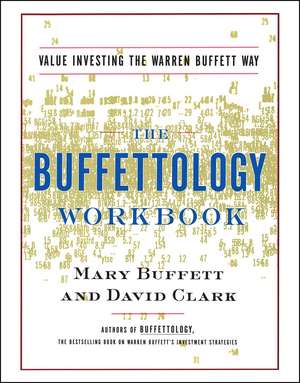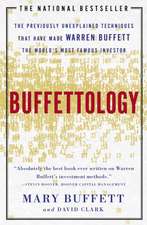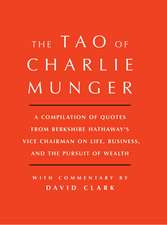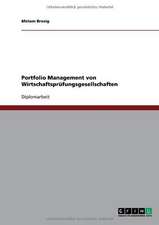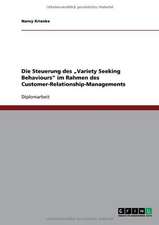The Buffettology Workbook: The Proven Techniques for Investing Successfully in Changing Markets That Have Made Warren Buffett the World's Most Famous Investor
Autor Mary Buffett, David Clarken Limba Engleză Paperback – 4 mar 2001
Preț: 119.60 lei
Nou
Puncte Express: 179
Preț estimativ în valută:
22.89€ • 24.85$ • 19.23£
22.89€ • 24.85$ • 19.23£
Carte disponibilă
Livrare economică 01-15 aprilie
Preluare comenzi: 021 569.72.76
Specificații
ISBN-13: 9780684871714
ISBN-10: 0684871718
Pagini: 192
Dimensiuni: 216 x 276 x 15 mm
Greutate: 0.54 kg
Ediția:Original
Editura: Scribner
Colecția Scribner
ISBN-10: 0684871718
Pagini: 192
Dimensiuni: 216 x 276 x 15 mm
Greutate: 0.54 kg
Ediția:Original
Editura: Scribner
Colecția Scribner
Notă biografică
Mary Buffett is the coauthor of Scribner’s bestselling Buffettology series, and a contributor to HuffPost and the online magazine Thrive Global. Mary’s online school—BuffettOnlineSchool.com—provides monthly investment insights and helps students learn to build successful stock portfolios.
For over twenty years, David Clark has been considered the world’s leading authority on the subject of Warren Buffett’s investment methods. His international bestselling investment books, The Tao of Charlie Munger and those coauthored with Mary Buffett—Buffettology, The Buffettology Workbook, The New Buffettology, The Tao of Warren Buffett, Warren Buffett and the Interpretation of Financial Statements, The Management Secrets of Warren Buffett, Warren Buffett and The Art of Stock Arbitrage, and The Warren Buffett Stock Portfolio—have been translated into more than twenty languages and are considered “investment classics” the world over.
For over twenty years, David Clark has been considered the world’s leading authority on the subject of Warren Buffett’s investment methods. His international bestselling investment books, The Tao of Charlie Munger and those coauthored with Mary Buffett—Buffettology, The Buffettology Workbook, The New Buffettology, The Tao of Warren Buffett, Warren Buffett and the Interpretation of Financial Statements, The Management Secrets of Warren Buffett, Warren Buffett and The Art of Stock Arbitrage, and The Warren Buffett Stock Portfolio—have been translated into more than twenty languages and are considered “investment classics” the world over.
Extras
Chapter One: Short-Sightedness and the Bad News Phenomenon: The Gifts That Keep On Giving
Short-sightedness and the bad news phenomenon. What are these things and what do they have to do with Warren Buffett? The answer is everything.
If the vast majority of the stock market were not short-sighted, Warren Buffett would never have an opportunity to buy some of the world's greatest businesses at discount prices. He could never have bought 1.7 million shares of The Washington Post twenty-seven years ago for approximately $6.14 a share. The Washington Post now trades at approximately $500 a share, which makes his $10.2 million initial investment worth approximately $863.8 million today. That equates to a pretax annual compounding rate of return of 17.8%. Without the short-sightedness of the stock market, Warren could not have bought Coca-Cola for $5.22 a share twelve years ago. It now trades at approximately $50 a share, which equates to a pretax annual compounding rate of return of approximately 21%.
Warren discovered early on in his career that 95% of the participants in the stock market, from Internet day traders to mutual fund managers who manage billions, are only interested in making a quick buck. Yes, some pay lip service to the importance of long-term investing, but in truth they are stuck on making fast money.
Warren found that no matter how intelligent a person is, the nature of the beast controls the investor's actions. Take mutual fund managers. If you talk to any of them, they will tell you that they are under great pressure to produce the highest yearly results possible. This is because mutual funds are marketed to a lay public that is only interested in investing in funds that earn top performance ratings in any given year. Imagine a mutual fund manager telling his or her marketing team that their fund ranked in the bottom 10% for performance out of all the mutual funds in America. Do you think the marketing team would jump up and down with joy and go out and drop a couple of million on advertising to let the world know that their fund ranked in the bottom 10%? No. More likely our underperforming fund manager would lose his or her job and some promising young hot shot would take over the fund's investment allocations.
Don't believe it? Ask people you know why they chose to invest in a particular mutual fund and they will more than likely tell you it was because the fund was ranked as a top performer. The nature of the mutual fund beast influences a lot of very smart people into playing a short-term game with enormous amounts of capital. No matter what fund managers' personal convictions may be, producing the best short-term results possible is the way to keep their job.
Warren also discovered that investors who get caught up playing a short-term game have very human reactions whenever they hear bad news about a company in which they own shares -- they sell them. To make the big bucks in the short-term game, the investor has to be one of the first to get in on the stock before it moves up, and one of first to get out before it moves down. Having access to the most up-to-date information available is of utmost importance. A good earnings report and the stock price moves upward. A bad earnings report and it moves downward. It doesn't matter whether earnings will improve in a year or two. All that anybody is interested in is what is going to happen today. If things look great this week, people will buy the stock, and if they look bad next week, they will sell it. This is why mutual funds are notorious for having such high rates of investment turnover. They get in and out of a lot of different stocks in hopes of beating the other guys in the competition for the all-important title Top Fund of the Year.
This "bad news phenomenon" -- the selling of shares on bad news -- is one constant in the ever-changing world of stock market trading. Watch any nightly business report on television and you'll see that after any negative news about a company is announced, the price of its shares drops. If the news is really bad, the shares will drop like a rock. It's the nature of the beast.
Bad news means falling share prices; bad news means that Warren's eyes light up. To Warren, the short-sightedness of the stock market, when combined with the bad news phenomenon, is the gift that keeps on giving. This combination of factors has produced for him one great buying opportunity after another, year after year, decade after decade, to the happy tune of $30 billion.
Before we jump to the next chapter, we'll let you in on one of Warren's best-kept secrets. He figured out that some, but not all, companies have economic engines that are so powerful they can pull themselves out of almost any kind of bad news mud that the short-sightedness of the stock market gets them stuck in. He has developed a specific list of criteria to help him identify those businesses. When these businesses are hit with bad news and the short-sighted stock market hammers their stock prices, he steps in and buys like crazy. He calls these wonderfully resilient businesses "consumer monopolies." Warren made all his big money by investing in consumer monopolies. They are the Holy Grail of his investment philosophy and we predict that they will be the next great love of your investment life as well.
KEY POINTS
FROM THIS CHAPTER
Study Questions
Why are most mutual funds fixated on short-term results?
How does Warren use a long-term perspective to exploit the stock market's short sightedness?
True or False Questions
1. T or F Mutual fund managers are short-term motivated because they market their products to an investment public that is extremely short-sighted.
2. T or F The majority of the investing public sells on bad news and buys on good.
3. T or F Warren buys on bad news.
4. T or F Consumer monopolies have the strong economic engines.
Answers: 1. True 2. True 3. True 4. True
Copyright © 2001 by Mary Buffett and David Clark
Short-sightedness and the bad news phenomenon. What are these things and what do they have to do with Warren Buffett? The answer is everything.
If the vast majority of the stock market were not short-sighted, Warren Buffett would never have an opportunity to buy some of the world's greatest businesses at discount prices. He could never have bought 1.7 million shares of The Washington Post twenty-seven years ago for approximately $6.14 a share. The Washington Post now trades at approximately $500 a share, which makes his $10.2 million initial investment worth approximately $863.8 million today. That equates to a pretax annual compounding rate of return of 17.8%. Without the short-sightedness of the stock market, Warren could not have bought Coca-Cola for $5.22 a share twelve years ago. It now trades at approximately $50 a share, which equates to a pretax annual compounding rate of return of approximately 21%.
Warren discovered early on in his career that 95% of the participants in the stock market, from Internet day traders to mutual fund managers who manage billions, are only interested in making a quick buck. Yes, some pay lip service to the importance of long-term investing, but in truth they are stuck on making fast money.
Warren found that no matter how intelligent a person is, the nature of the beast controls the investor's actions. Take mutual fund managers. If you talk to any of them, they will tell you that they are under great pressure to produce the highest yearly results possible. This is because mutual funds are marketed to a lay public that is only interested in investing in funds that earn top performance ratings in any given year. Imagine a mutual fund manager telling his or her marketing team that their fund ranked in the bottom 10% for performance out of all the mutual funds in America. Do you think the marketing team would jump up and down with joy and go out and drop a couple of million on advertising to let the world know that their fund ranked in the bottom 10%? No. More likely our underperforming fund manager would lose his or her job and some promising young hot shot would take over the fund's investment allocations.
Don't believe it? Ask people you know why they chose to invest in a particular mutual fund and they will more than likely tell you it was because the fund was ranked as a top performer. The nature of the mutual fund beast influences a lot of very smart people into playing a short-term game with enormous amounts of capital. No matter what fund managers' personal convictions may be, producing the best short-term results possible is the way to keep their job.
Warren also discovered that investors who get caught up playing a short-term game have very human reactions whenever they hear bad news about a company in which they own shares -- they sell them. To make the big bucks in the short-term game, the investor has to be one of the first to get in on the stock before it moves up, and one of first to get out before it moves down. Having access to the most up-to-date information available is of utmost importance. A good earnings report and the stock price moves upward. A bad earnings report and it moves downward. It doesn't matter whether earnings will improve in a year or two. All that anybody is interested in is what is going to happen today. If things look great this week, people will buy the stock, and if they look bad next week, they will sell it. This is why mutual funds are notorious for having such high rates of investment turnover. They get in and out of a lot of different stocks in hopes of beating the other guys in the competition for the all-important title Top Fund of the Year.
This "bad news phenomenon" -- the selling of shares on bad news -- is one constant in the ever-changing world of stock market trading. Watch any nightly business report on television and you'll see that after any negative news about a company is announced, the price of its shares drops. If the news is really bad, the shares will drop like a rock. It's the nature of the beast.
Bad news means falling share prices; bad news means that Warren's eyes light up. To Warren, the short-sightedness of the stock market, when combined with the bad news phenomenon, is the gift that keeps on giving. This combination of factors has produced for him one great buying opportunity after another, year after year, decade after decade, to the happy tune of $30 billion.
Before we jump to the next chapter, we'll let you in on one of Warren's best-kept secrets. He figured out that some, but not all, companies have economic engines that are so powerful they can pull themselves out of almost any kind of bad news mud that the short-sightedness of the stock market gets them stuck in. He has developed a specific list of criteria to help him identify those businesses. When these businesses are hit with bad news and the short-sighted stock market hammers their stock prices, he steps in and buys like crazy. He calls these wonderfully resilient businesses "consumer monopolies." Warren made all his big money by investing in consumer monopolies. They are the Holy Grail of his investment philosophy and we predict that they will be the next great love of your investment life as well.
KEY POINTS
FROM THIS CHAPTER
- Warren discovered that everyone from mutual fund managers to Internet day traders are stuck playing the short-term game. It is the nature of the stock market.
- The bad news phenomenon is a constant -- people sell on bad news.
- Companies that have consumer monopolies have the economic power to pull themselves out of most bad news situations.
- Warren made all his big money investing in consumer monopolies.
Study Questions
Why are most mutual funds fixated on short-term results?
How does Warren use a long-term perspective to exploit the stock market's short sightedness?
True or False Questions
1. T or F Mutual fund managers are short-term motivated because they market their products to an investment public that is extremely short-sighted.
2. T or F The majority of the investing public sells on bad news and buys on good.
3. T or F Warren buys on bad news.
4. T or F Consumer monopolies have the strong economic engines.
Answers: 1. True 2. True 3. True 4. True
Copyright © 2001 by Mary Buffett and David Clark
Cuprins
Contents
INTRODUCTION
PART I:
UNDERSTANDING VALUE INVESTING
1: Short-Sightedness and the Bad News Phenomenon:
The Gifts that Keep On Giving
2: Identifying the Economic Engine Warren Wants to Own
3: Identifying the Sick/Commodity Type Business
4: The Healthy Business: The Consumer Monopoly
(Where Warren Finds All the Money)
5: Determining if the Business Has a Consumer Monopoly
6: Where to Look for a Consumer Monopoly
7: The Bad News that Creates a Buying Situation
PART II:
WARREN BUFFETT'S INTRINSIC VALUE EQUATIONS
8: Finding the Company and the Numbers
9: Financial Calculation #1: Predictability of Earnings
at a Glance
10: Financial Calculation #2: A Test to Determine Your
Initial Rate of Return
11: Financial Calculation #3: Test for Determining
the Per Share Growth Rate
12: Financial Calculation #4: Relative Value to Treasury Bonds
13: Financial Calculation #5: Understanding Warren's
Preference for Companies That Earn High Rates
of Return on Shareholders' Equity
14: Financial Calculation #6: Determining the Projected Annual
Compounding Rate of Return: Part I
15: Determining the Projected Annual Compounding
Rate of Return: Part II
16: Financial Calculation #7: The Equity/Bond with
an Expanding Coupon
17: Financial Calculation #8: Using the Per Share Earnings
Annual Growth Rate to Project an Investment's
Compounding Annual Rate of Return
18: Financial Calculation #9: Why Warren Loves Stock
Repurchase Programs, or, How Can a Company Increase
Its Shareholders' Fortunes By Buying Back the Company's Stock
19: Financial Calculation #10: How to Determine if Per Share
Earnings Are Increasing Because of Share Repurchases
20: Financial Calculation #11: How to Measure Management's
Ability to Utilize Retained Earnings
21: Financial Calculation #12: The Internet and Warren's
Short-Term Arbitrage Commitments
22: Doing It Yourself: Buffettology Worksheet
23: Bringing It All Together: The Case Studies
INTRODUCTION
PART I:
UNDERSTANDING VALUE INVESTING
1: Short-Sightedness and the Bad News Phenomenon:
The Gifts that Keep On Giving
2: Identifying the Economic Engine Warren Wants to Own
3: Identifying the Sick/Commodity Type Business
4: The Healthy Business: The Consumer Monopoly
(Where Warren Finds All the Money)
5: Determining if the Business Has a Consumer Monopoly
6: Where to Look for a Consumer Monopoly
7: The Bad News that Creates a Buying Situation
PART II:
WARREN BUFFETT'S INTRINSIC VALUE EQUATIONS
8: Finding the Company and the Numbers
9: Financial Calculation #1: Predictability of Earnings
at a Glance
10: Financial Calculation #2: A Test to Determine Your
Initial Rate of Return
11: Financial Calculation #3: Test for Determining
the Per Share Growth Rate
12: Financial Calculation #4: Relative Value to Treasury Bonds
13: Financial Calculation #5: Understanding Warren's
Preference for Companies That Earn High Rates
of Return on Shareholders' Equity
14: Financial Calculation #6: Determining the Projected Annual
Compounding Rate of Return: Part I
15: Determining the Projected Annual Compounding
Rate of Return: Part II
16: Financial Calculation #7: The Equity/Bond with
an Expanding Coupon
17: Financial Calculation #8: Using the Per Share Earnings
Annual Growth Rate to Project an Investment's
Compounding Annual Rate of Return
18: Financial Calculation #9: Why Warren Loves Stock
Repurchase Programs, or, How Can a Company Increase
Its Shareholders' Fortunes By Buying Back the Company's Stock
19: Financial Calculation #10: How to Determine if Per Share
Earnings Are Increasing Because of Share Repurchases
20: Financial Calculation #11: How to Measure Management's
Ability to Utilize Retained Earnings
21: Financial Calculation #12: The Internet and Warren's
Short-Term Arbitrage Commitments
22: Doing It Yourself: Buffettology Worksheet
23: Bringing It All Together: The Case Studies
Recenzii
Stevin Hoover Hoover Capital Management Absolutely the best book ever written on Warren Buffett's investment methods.
BusinessWeek A probe inside the head of a financial genius.
Rocky Mountain News (Denver) One of the best books about mega investor Warren Buffett.
BusinessWeek A probe inside the head of a financial genius.
Rocky Mountain News (Denver) One of the best books about mega investor Warren Buffett.
Descriere
This companion to the bestselling BUFFETOLOGY guides readers step by step through the same process billionaire investor Warren Buffet uses when deciding what to invest in- and when.
